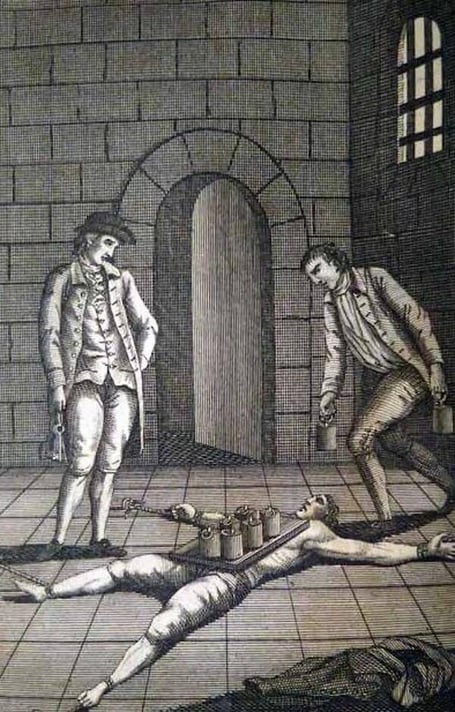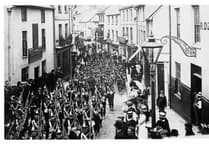WHILE capital punishment ended in the UK nearly 60 years ago with the last hangings, death for criminals in past centuries could be totally brutal.
The Beacon can reveal that 350 years ago in Monmouth, a man who murdered his mother on Vauxhall Fields paid for his terrible crime by being pressed to death by ‘stone and iron’ in the town gaolor’s cellar.
His sister, who was accused of knowing about the murder plot and covering up for him, was burnt at the stake in another act of judicial savagery, while his 15-year-old servant was hanged.
A 1672 religion-heavy pamphlet rushed out after the case still exists, entitled “The Bloody murtherer, or, The unnatural son his just condemnation at the assizes held at Monmouth”.
It tells how Henry Jones enticed his mother Grace Jones down to her smallholding beside the River Monnow, and shot her hoping to inherit her wealth.
The 50-page pamphlet, which has pages dwelling on the culprits’ sins, confessions and prayers for redemption, says: “The principal actor in this barbarous tragedy was Henry Jones, the son of Thomas Jones, late of Monmouth in South Wales, and Grace his wife; parents miserably unhappy to bring into the world so ungrateful and unnatural a wretch, that justly came to suffer an ignominious death, for bereaving her of life, from whom he thus derived his own.”
It outlines how his “provident father” provided him with a good education and a position with a lawyer. But instead of bettering himself, Henry ‘kept debauched company, learning to drink, and other extravagancies too frequently practised by some”.
And his incessant demands for money saw his mother rein in her generosity, sending him “into a rage” and fostering “hellish thoughts” of “sending her out of this world”.
He drew his servant George Bridges into his ‘infernal’ plot to murder her with promises of “five pounds in money, and a new suit of cloathes”.
And enacting their ‘black design’, the duo moved sheaves of corn out of his mother’s barn before persuading her to the banks of the Monnow with a tale of theft, having hidden them in nearby woods.
Having shown her a trail of corn leading to the woodland “this graceless, inhumane, and unnatural wretch, her son… discharges a pistol at her, from which she received a mortal shot, with a slug or loget, in the right side of her head”.
Returning later to ensure she is dead, the teenage servant cut her throat with a knife and Henry stole her money and removed the rings from her fingers. But woken in bed next morning by magistrates and taken to the murder scene, “footsteps” were found to perfectly fit the son’s shoes and he was charged with murdering his mother.
The servant boy confessed under questioning and Henry’s sister Mary was also arrested and accused of washing his bloody clothes after the killing to cover up the crime and telling her younger siblings to keep their mouths shut.
She was bailed, but rearrested when caught running away to London.
At the Monmouth Assizes, to save his mother’s estate for his wife and children, Henry stood mute when asked to plead, resulting in the dreadful sentence of ‘Pain, Fort, & Dure’ – being weighted down until death.
The pamphlet added: “’Tis a punishhment of all others the most grievous and fearful; the reason of this terrible Judgment is there rendred, because he refused to stand to the common Law of the Land, that is, Lawful and due Tryal.”
The execution took place in “some low and dark place”, a cellar belonging to Monmouth gaolor George Sadler, and lasted an excruciating two days and nights before he expired.
But the pamphlet writer was also keen to recount at length his prayers before being weighted down, and acknowledgment that “he no longer deserved to tread on the face of the earth, or to look up to Heaven”.
Despite protesting her innocence, his sister was proven guilty of being party to the brother’s crime, and suffered a horrendous public death, drawn on a sled through the town alongside the servant, who was hanged, and burnt at the stake.
Thankfully, whatever the killers may have deserved, we’re spared such horrors today.
But some things never change. The pamphlet ends with a somewhat incongruous word from its sponsor: “Dr. Bromfield’s Pills against the Scurvey, and all other diseases, are to be Sold by Thomas Hancox Bookseller in Hereford.”





Comments
This article has no comments yet. Be the first to leave a comment.